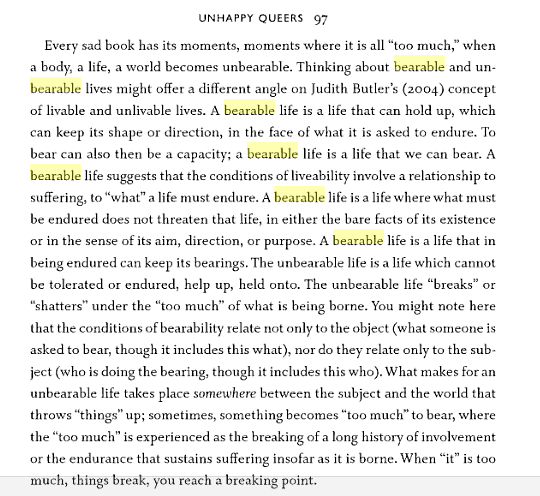For the past several weeks, my queering desire class has been reading Sara Ahmed’s The Promise of Happiness. Here are my class summaries for our discussions of Ch. 2 on the feminist killjoy and Ch. 3 on unhappy queers. In reading through the chapters, I have come across several passages/ideas that I would like to use/critically reflect/incorporate/put beside my own work on troublemaking. I want to use this blog entry as a space for beginning a few different engagements with the material.
Engagement 1: Bearable and Unbearable lives
On page 97 of The Promise of Happiness, in her chapter on “Unhappy Queers,” Sara Ahmed writes:

I don’t have much else to write about this right now. I must admit that I skipped ahead to engagement 2 and have spent too long thinking about it. Now I am out of time. I am struck by the slippage that I see in J Butler’s work between the unbearable, bearable, livable and good life. I briefly wrote about it in my essay on Living and Grieving Beside Judith. Here’s the fragment:
Butler contrasts her notion of the livable/bearable life with the good life and argues that the good life is only available to people whose lives are already possible and recognizable and who don’t have to devote most of their energy to figuring out ways to survive and persist (Undoing Gender, 31-32). For her, the question of the livable life must necessarily precede the question of the good life, because to strive for a good life, one must first be recognized as having a life (Undoing Gender, 205).
My mom started falling down a lot. It wasn’t safe for her to be alone. The decision was made to begin hospice care. She was no longer living with cancer; she was dying from it. She had entered the final stage. Any thoughts about a cure or remission—that hope for a good life to be achieved again in the future—was replaced by practical discussions of how to ensure that she continued to have a comfortable life that was free of pain. The good or even livable life were no longer possible for her. The best she could hope for was the bearable life. And what she could expect (and eventually did reach) was something that seemed even less than the bare minimum requirements of life. Yet, even as I witnessed her decline and the resultant shift from good to livable to bearable to unbearable life, I can’t really make sense of her experiences of those last four years (or even the last six months) as just surviving until the inevitable. Up until those last days, years after she was supposed to die, she lived and, in moments, however fleeting, flourished. She enjoyed life, she laughed, and she loved her daughters, her grandchildren and my dad.
What makes for the livable life? How do we distinguish that life from ones that are merely bearable or others that flourish? Who gets to make this distinction and how do they do it? My mother’s living and dying with pancreatic cancer pushed at the limits of my understandings of life and how and when it is possible.
I want to continue thinking about the differences/connections in these various forms of “life.” How do we distinguish unbearable from bearable from livable from good?
Engagement 2: Because/Happiness as Stopping Points
In her conclusion, Ahmed offers up the following description of happiness as a stopping point for discussion, much like how “because” functions in stopping childrens’ relentless posing of questions:
Happiness becomes a stopping point; happiness allows us to stop at a certain point, rather like the word because. The child asks you questions, or I ask questions in a way that people might say is “childlike.” Why this? If this, then why that? What that, then why…? Anything can take the place of the dots; the empty place that always marks the possibility of another question, the endless deferral that reminds us that all answers beg questions and that to give an answer is to create the condition of possibility for another question. Eventually, you stop. You must stop. You have to stop to put a stop to the questions because there are other things to do with your time. So you say, “because.” Why because? Because “because.” When because becomes an answer to a question the conversation can stop. Happiness provides such a because, a “because because.” We desire things, because of happiness. Because of happiness, we desire things. Happiness is how we can end the conversation about why it is that we desire what we desire. Happiness provides us with a full stop, a way of stopping an answer from being a question (203).
There are so many different ways in which this passage resonates for me and my thinking about the value of asking questions and the limits that are (sometimes necessarily) placed on that perpetual questioning of everything. What are the limits of questions? Should we ever stop? I don’t think these are the right questions to ask; they might even encourage us to stop asking questions even before we begin (which is connected to Ahmed’s point that happiness/because shut down a lot of possibilities for imagining of/living in worlds). Much like that annoying utterance, because. This reminds me of one of my recent tweets:
For more on Freire and the pedagogy of the question, check my discussion here and here. Is there a way to take a break from questions without stopping them? Can we answer questions in ways that signal our willingness to continue the conversation later? I strongly dislike answering any question with “because.” I have done it–my 4 year old asks a lot of questions. She reserves the most random and weighty ones for right after she has been tucked into bed, when I am least prepared to engage with them. I really try not to answer with “because,” or the even worse, “because…I said so!,” but what do we do when we are so tired from the day or uncertain about how to answer some very deep and highly politicized questions (about the meaning of existence, gender roles, why we die, G/god, and more)? Here’s one response by Freire in his “talking book” with Antonio Faundez, Learning to Question:
While I admire (and sometimes aspire to) this goal, I disagree with it as an unquestioned guiding principle. There should be limits to our questions (maybe not the amount that we have, but when and how we ask them). In my own thinking about curiosity and asking questions, I want to think about the different forms that curiosity can take and the different motivations we might have for asking questions. Curiosity about the world is often motivated by an agonistic desire to know (as in, to conquer, classify and contain). Sometimes it comes at the expense of other considerations (like respect for others and their desire to not be the objects of our scrutiny). It can encourage us to pay too much attention, to stare and to make spectacles of others whom we find strange. So, curiosity and the “right to ask questions” should not be uncritically promoted. Instead it needs to be encouraged in tandem with the development of a critical awareness of how and when to ask questions (not just a relentless “why?” but a “at whose expense?” and maybe, “what effects/affects do my questions have on others?”). On another, perhaps more personal note, even as I want my kids to ask lots of questions (and never lose that curiosity and wonder about the world), I do not want to encourage them to interrupt me (and others) at any moment with their questions. Even as I write these last few sentences, I am uncertain about my conclusions. In thinking about the how/why, I am not interested in establishing “proper” rules for questioning. Instead, I want to encourage myself/others/my kids to always consider the consequences of their questions and to pay critical attention to the world that is happening in their midst of their curiosity. How is this encouragement/paying attention possible? Hmm…makes me think of my interest in curiosity as care…
Partly because I don’t like to have blog entries are the strictly prose, I wanted to add in two youtube videos that I found through my search of “curiosity asking questions.” The first one is entitled “A Study of Insistent Curiosity” and is part of 1shylah’s Channel or The Cybernetic Baby.
Some fascinating stuff. A little kid is exploring while someone (her dad?) films them. The kid repeatedly reaches for things that they are not supposed to, especially the lighter fluid. The person taking the video keeps saying “no” and “put it back” over and over again, but the kid keeps going back. They wonder why they can’t properly discipline the kid. At one point, towards the end of the video (starting at 7 mins in), the person taking the video exclaims, “Why don’t you learn? How did you get like this? Is it human nature? Where does your rebelliousness come from? Is it genetic? It must be genetic.” In some of their final remarks, the person taking the video promises to have a solution for how they disciplined the kid. I haven’t found that video yet. I don’t want to offer up an analysis of this clip. Instead I just want to pose it as a question about the nature/limits of curiosity and how we should encourage/discourage it in others, especially kids?
Okay, one more clip. I love youtube and how it allows me to find all sorts of examples/ideas with which to engage. This second clip was also found through my youtube search on “asking questions curiosity.” It’s part of the expertvillage youtube channel. Unfortunately you have to watch a brief commercial (not sure if it the same one every time. The one that I just watched was rather bothersome in its heteronormativity). This video is entitled, “Promoting curiosity in children.”
In this video, a women (presumably a/the mother) encourages parents to provide more opportunities for exploring that curiosity. After starting out with a brief discussion of using a telescope to watch a lunar eclipse, she suggests a few more ways to spark curiosity through exposing kids to new things, like: take kids to restaurants that have “different” types of food that they have never tried before (1:05) or to cultural events like a Native American “pow wow” (1:20). I can’t help but think about this in the context of my brief reference above to curiosity and conquering. Is it enough to encourage kids to try “new” things, like “different” (read as strange, “ethnic”) foods without considering the imperialist implications of this curiosity? I know I should/need to say more about what I mean with that last question, but I don’t want to right now. Instead, I want to leave it as an unfinished thought (an unanswered question) to take up again later (hopefully soon).



